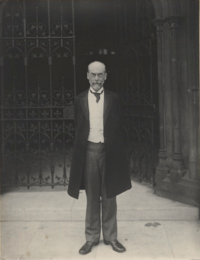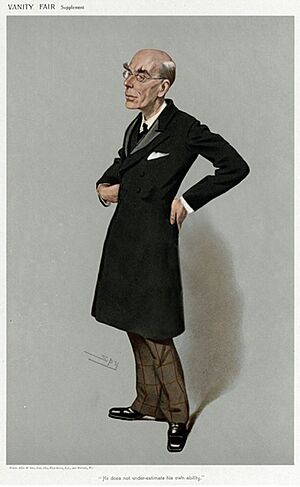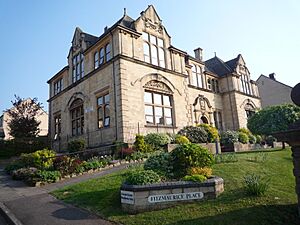Edmond Fitzmaurice, 1st Baron Fitzmaurice facts for kids
Quick facts for kids
The Lord Fitzmaurice
|
|
|---|---|
 |
|
| Chancellor of the Duchy of Lancaster | |
| In office 13 October 1908 – 25 June 1909 |
|
| Monarch | Edward VII |
| Prime Minister | H. H. Asquith |
| Preceded by | The Viscount Wolverhampton |
| Succeeded by | Herbert Samuel |
| Personal details | |
| Born | 19 June 1846 Lansdowne House, London |
| Died | June 21, 1935 (aged 89) |
| Nationality | British |
| Political party | Liberal |
| Spouse | |
| Education | Eton College |
| Alma mater | University of Cambridge (MA) |
Edmond George Petty-Fitzmaurice, 1st Baron Fitzmaurice (born June 19, 1846 – died June 21, 1935) was an important British politician. He was a member of the Liberal Party. From 1863 to 1906, people called him Lord Edmond FitzMaurice.
He worked as the Under-Secretary of State for Foreign Affairs twice. This job meant he helped manage Britain's relationships with other countries. He held this role from 1883 to 1885 and again from 1905 to 1908. In 1908, he joined the government's main group, called the Cabinet. He became the Chancellor of the Duchy of Lancaster under Prime Minister H. H. Asquith. Sadly, he had to leave this job the next year because he became ill.
Contents
Early Life and Education
Edmond Fitzmaurice was born in Lansdowne House in London. He was the second son of Henry Petty-FitzMaurice, 4th Marquess of Lansdowne. His mother was Emily de Flahault. She was the daughter of a French statesman. His older brother, Henry Petty-FitzMaurice, 5th Marquess of Lansdowne, also became a famous politician.
Edmond went to Eton College, a well-known school. After that, he studied at Trinity College, Cambridge, a famous university. In 1866, he was the leader of the Cambridge Union, a debating society. He studied classical subjects like ancient Greek and Roman history. He finished his studies with top grades in 1868.
Political Career
In 1871, Fitzmaurice became a lawyer at Lincoln's Inn. However, he never actually worked as a lawyer. In 1868, he was chosen to represent the area of Calne in Parliament. This was a family area, and he was elected without anyone running against him. He kept this seat until 1885.
From 1872 to 1874, he worked as a special assistant to Robert Lowe. Mr. Lowe was the Chancellor of the Exchequer, who managed the country's money. Later, Lowe became the Home Secretary, in charge of internal affairs. In 1874, the Liberal Party lost power.
In 1880, Fitzmaurice was sent to Constantinople (now Istanbul). His job was to help reorganize parts of the Ottoman Empire. This was after the Berlin Treaty of 1878. He had many big ideas for the area, but they were never put into action.
The Liberal Party came back to power in 1880. In 1883, William Gladstone made Fitzmaurice the Under-Secretary of State for Foreign Affairs. He held this job until 1885, when the Liberal government fell again.
The Calne area he represented was changed in 1885. He then tried to become the Liberal candidate for a Glasgow area. But he became ill and had to step back from public life for a while. He returned in 1887 and tried to get back into Parliament. He ran for election in 1892 and 1895 but did not win.
However, in 1898, he successfully won a special election for the Cricklade area. He represented Cricklade until 1906. When the Liberals came to power again in late 1905, Fitzmaurice got his old job back. He became the Under-Secretary of State for Foreign Affairs again.
In 1906, Fitzmaurice decided not to run for election again. Instead, he was given a special title: Baron Fitzmaurice. This meant he became a member of the House of Lords. He stayed at the Foreign Office when H. H. Asquith became Prime Minister in 1908. He also joined the Privy Council that same month.
In October 1908, he was made Chancellor of the Duchy of Lancaster. This job meant he was part of the government's main decision-making group, the Cabinet. But his illness returned, and he had to resign the next year. This was the end of his political career.
Other Work and Writings
Besides his work in national politics, Lord Fitzmaurice was also the leader of the Wiltshire County Council from 1896 to 1906. He was also a writer and wrote books about important people. He wrote about his great-grandfather, William Petty, 2nd Earl of Shelburne, who was a Prime Minister. He also wrote about Sir William Petty, an economist and scientist.
Some of the books Lord Fitzmaurice wrote include:
- 1895:
 The Life of Sir William Petty, 1623-1687
The Life of Sir William Petty, 1623-1687 - 1901: Charles William Ferdinand, Duke of Brunswick : An Historical Study, 1735-1806.
- 1905: The life of Granville George Leveson Gower, second earl Granville, K.G., 1815-1891 (in 2 books)
- 1912: Life of William, earl of Shelburne, afterwards first marquess of Lansdowne (in 2 books)
- 1914: The country dressmaker : a play in three acts.
- 1914: Dandy dolls.
- 1914: Moonlighter.
Awards and Honours
In 1914, Fitzmaurice became a Fellow of the British Academy (FBA). This is a special honour for people who have made great contributions to the humanities and social sciences.
He also helped pay for the County School in Bradford-on-Avon. After he died, the school was renamed Fitzmaurice Grammar School in his honour. Fitzmaurice Primary School is also named after him. Dauntsey's School has a school house named after him because he was a governor there from 1893.
Personal Life
Lord Fitzmaurice married Caroline FitzGerald in 1889. She was from Connecticut. Their marriage ended in 1894, and they did not have any children.
He passed away in June 1935, just two days after his 89th birthday. Since he had no children, the title Baron Fitzmaurice ended when he died. Fitzmaurice lived at Leigh House in Bradford-on-Avon, which is now the Leigh Park Hotel. His family's main home was Bowood House, near Chippenham.
 | William Lucy |
 | Charles Hayes |
 | Cleveland Robinson |



